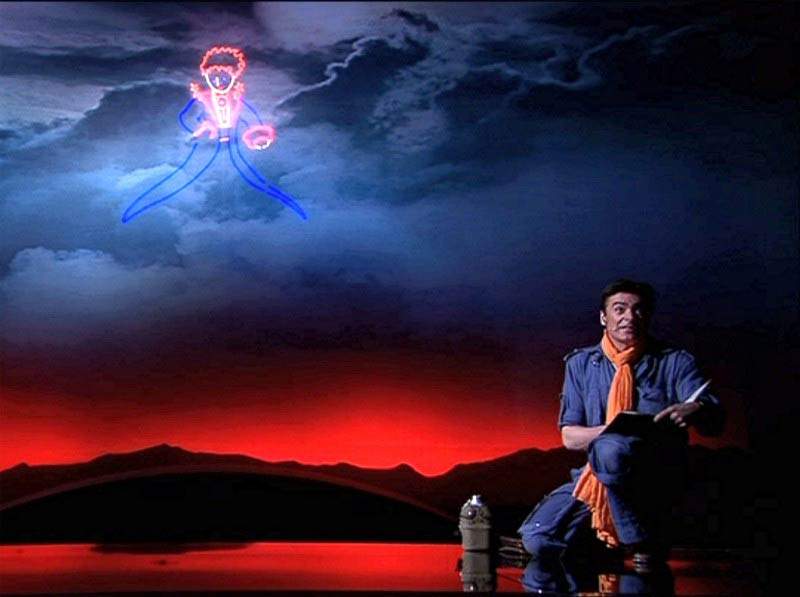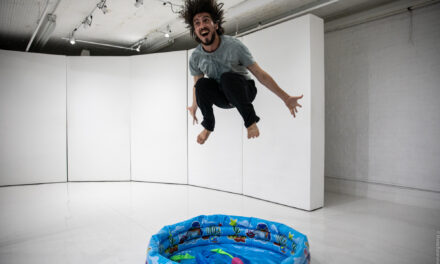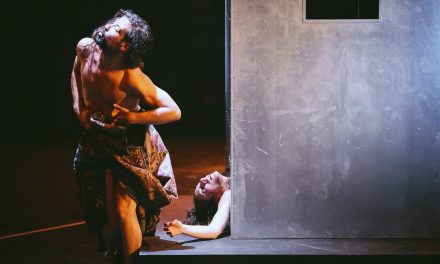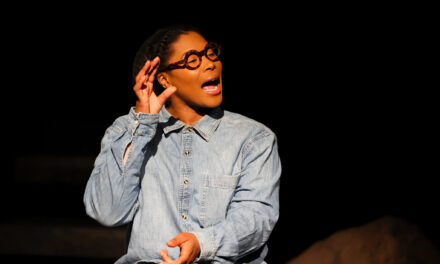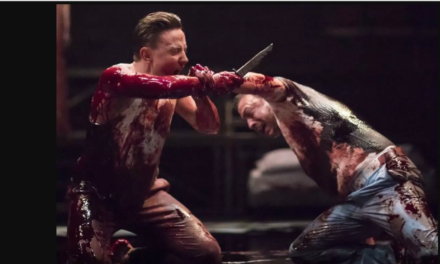Dedicated to the 80th anniversary of the very first publication of Antoine de Saint-Exupéry’s fairy tale “The Little Prince” and the 20th anniversary of the musical of the same name.
“Teach me the art of small steps…”
Prayer, Antoine de Saint-Exupéry
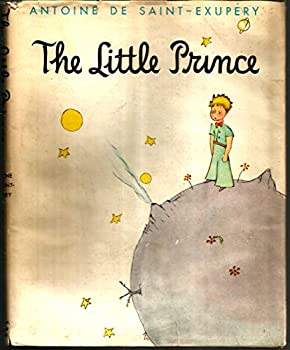
Cover of the book The Little Prince by Antoine de Saint-Exupery. First edition, New York, 1943, Reynal&Hithcock Inc. Includes the original drawings of the author
There are many works written by various bibliographers and researchers of Antoine de Saint-Exupéry’s life and creative work. At that, there is no established notion of the writer’s personality as it was or the reason for his early departure from this world. There is no unequivocal assessment of his most famous creation – the philosophical fairy tale The Little Prince, either. In the number of translations into various languages all over the world, the parable yields only to the Bible. The answer to the question – what this fairytale is about? – remains unanswered. The range of opinions is grand: about the Good and the Evil, about love and friendship, about loneliness and defenselessness, about the reluctance to grow up, about teen suicide, and reflections on death as means of deliverance from the burdens of life.
For the very first time The Little Prince was published in English, in New York, and it occurred exactly eighty years ago. That makes for a good reason to open and re-read this miraculous book once again.
What did Saint-Exupéry have in mind when he said: “You become responsible forever for what you’ve tamed?” A multitude of small steps toward each other, give birth to invisible ties and connections, that allow us to tame someone. No matter whether it’s a human being, an animal, a bird, or a flower… Thus, he tamed the Fox in the lonely desert in Libya, where his plane had to make an emergency landing. There he found his Little Prince – who came to Saint-Ex like a mirage. And Saint-Ex made him the hero of the famous fairy tale. Why the Little Prince, you will ask? Because perception works differently for children than it does for adults, their feelings don’t follow any logic, the principle of systemic thinking doesn’t work and they lack a materialistic basis. This is how children are, all of them. Did Saint-Ex want to remain a kid forever? No. After all, this is what he asked God for in his prayer, which he wrote when he was going through one of the roughest periods in his life: “Lord, I’m not asking for miracles and visions, I’m only asking for strength to get through the day. Teach me the art of small steps.” Most of all he valued friendship: “You know how much we need friendship. Make me worthy of this nicest, hardest, riskiest, and most fragile gift of life.” And above all exploits, he considered the opportunity to be “…in the right place, at the right time, with words or with silence …to be able to share with someone a little bit of warmth…” – most important.
Throughout his whole life, Saint-Exupéry fought to overcome himself. He was able to overcome the terrestrial gravity, having reached the stars. He made home for the Little Prince among the stars and sheltered him from the danger of becoming just like all the grown-ups, who “…haven’t time to learn anything. They buy things ready-made in stores. But since there are no stores where you can buy friends, people no longer have friends.” The Little Prince – is a testament to Mankind, and if it was written as a proper testament, it would approximately sound like this: distinguish the paramount from the secondary, know where to draw the line, appreciate each moment of your life, and learn how to manage your time wisely, help the weak, allow your heart to argue with the mind, don’t do what must be done but what you need to do for yourself. That is basically what the fairy tale is about. That is the philosophy behind it. At that one must attempt to stay in harmony with the surrounding reality, where not everyone is ready to accept such philosophy. Such a task was extremely difficult for Saint-Ex. He loved life. He valued friendship and human relations above anything else. And did his best to make the world a better place.
His tragic death, when his plane fell into the Mediterranean Sea, while on a special assignment flight, was turned into a conspiratorial quest. So many planes crashed during the years of war, but specifically in this case, people wanted to write their ending to this fairy tale: the Captain of birds, as he got nicknamed by the Arabs, voluntarily and deliberately flew away toward the stars, where the Little Princes live with their sheep, foxes, and roses, that can brag about only four thorns…It became a beautiful epilogue, predetermining the appearance of numerous sequels.
One of the many books inspired by the original needs to be singled out – The Return of The Little Prince written by the niece of the famous writer – Ysatis De Saint-Simone – is created in true “Saint-Exupéry fashion”, since Ysatis has a deep understanding of the original fairy tale and what lies behind it.
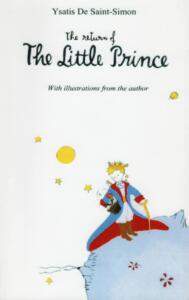
Cover of the book The Return of the Little Prince by Ysatis de Saint-Simone. With illustrations from the author. 2004, The Seventh Angel Production
In the foreword, Ysatis says some of the very important words, addressed to her famous relative: “Oh, Saint-Ex I have so many things to tell you!… Like you, Saint-Ex, I have stars that know how to laugh! The Little Prince has shown me his secret…Saint-Ex, he is here again!” Saint-Ex would have loved to hear those exact words… Ysatis has accomplished the impossible: in that very same desert, under the lonely star of her own, at the very place where the Little Prince disappeared previously, she found him once again. And just like before, he didn’t answer any of her questions but asked many. When he asked his new friend and interlocutor what she was looking for, she answered: “…I am searching for God as a reality…” And together with the Little Prince, Ysatis searched for answers to the questions and issues that worried Antoine de Saint-Exupéry: what is the Kingdom of Light and how can one reach it?
Was the author a religious man? Well, he did believe in God. He believed that each person has his or her own way of connecting with the Almighty. And each person needs their own prayer. In his understanding, God could not remain deaf to pleas that had anything to do with spiritual values. During his lifetime, Saint-Ex kept constantly working on himself, making himself better each day and working for the common good, as he perceived it. Saint-Ex supposed that having risen above sins and vices, he could make society better. And, no doubt, he has succeeded. Perhaps, it was only one small step, similar to the one of a sparrow, but the world became better. And many more steps can be made if we all follow the testament of the writer!
Ysatis, intuitively, guessed one extremely important thing, which often escapes the reader: Saint-Ex tried to explain to us, that there are two types of cosmoses out there: one – beyond the limits of the celestial bodies, and the other one – within each one of us. In the book, written by Ysatis, the idea of the inner cosmos and its infinity, compared only to the scope of the Universe – becomes more obvious. I would strongly suggest – taking this book in your hands, leafing through it, and looking at the beautiful drawings by the author.
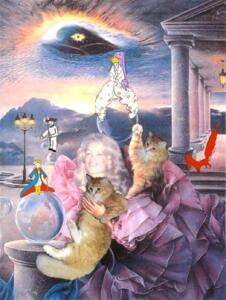
Ysatis, Sunface and the Little Prince’s Magical World by Ysatis de Saint-Simone. From personal archive of the artist
Ysatis De Saint-Simone was kind to agree to an interview, and below, you can read what she had to say.
Lisa Monde: Eight years ago, you gave me your book The Return of the Little Prince! I read it and re-read it. And I remember well the very first feeling that I got when I read your book – I felt so light and enlightened. In your own words, could you please tell our readers what your book is about?
Ysatis de Saint-Simone: It is extremely important that the message of my book has never been detected by those who Saint-Exupéry called “the grown-ups.” The intellectual people who analyze and make conclusions. They say the Little Prince was looking for responsible men and that is an outrageous statement because it has nothing to do with human behavior, which we would consider good or bad. But it has everything to do with finding your true essential nature and becoming it. That’s what The Little Prince is all about. And my book contains this information, because I received this information from the source, from my aunt, who was distressed with the exteriorization of something so powerful and beautiful as finding your own true essential nature and becoming it. My book is for anyone who wants to break through to the other side and be themselves. It is about finding your own true self spiritually and otherwise, it has nothing to do with religion, any religion, it has to do with the essential reason why the soul has taken over a body to live the life on this earth.
LM: I believe, I have seen your book in other countries. Was it translated?
YdSS: Yes, it was translated into Danish.
LM: I’ve read in your foreword to the book that the story is based on your personal experience. How you met the Little Prince. Now, is it the same Little Prince that Saint-Exupéry met?
YdSS: Yes. When I was a child, it became my task to let Saint-Ex know once I found the Little Prince myself. Just like Saint-Ex said: “If you see him, please let me know…” Because he didn’t know what would be, he was sad to see the lack of understanding. So, in my childlike mind, I was convinced that the Little Prince was real. I knew I must find the Little Prince. So, I kept searching. At first, I didn’t even know what I was searching for, I didn’t know what the Little Prince was… That search, that journey, became very important in my life. And when I grew up, when I found myself, was initiated and found that place as he described – in the desert, under the star. Saint-Ex said: “You will know…” and it happened to me! What he explained, happened to me and then I wrote my book. It just came to me, without thought. I didn’t think: “Should I say this or that…” – when I wrote, I felt like someone was dictating this book to me as I wrote. It came to me like I was the pen and someone else was writing with my help.
LM: What do you think Saint-Ex wanted to say with his fairytale for grown-ups – The Little Prince?
YdSS: He wanted to let the people know that there is an experience that can free them. And they must search for it. Such an experience freed him. All of it – is the Power of Love that moves the universe. And once you find it – you’re free. The place under the lonely star is within you, but the desert – is the world around us.
LM: I believe that when a person comes into this world – they have a certain purpose to fulfill. And a lot of talented people leave this world early. And that happens once they complete their purpose. So, would you say that Saint-Ex wanted to die because he has fulfilled his purpose on this earth? And that’s why he left?
YdSS: Yes, I do think so. He felt like there was nothing left for him to do. At that point, he was hiding, literally, in that fisherman’s village. My aunt would visit him, but she would not say anything either. So, he has retreated from the world. The family of Saint-Ex were the grown-ups that he talked about. And they live in another dimension and have a different understanding of things. I don’t think Saint-Ex wanted to commit suicide. But we all return to where we essentially come from first. He felt that it was his time to go. He didn’t want to go back to Paris, where my aunt lived. He didn’t want to play that same role again.
LM: I am so glad you said that because whenever I think about his suicide, it makes me feel so sad. Saint-Ex said it himself: “…It is only with the heart that one can see rightly; what is essential is invisible to the eye.” So, I want to believe in my heart, that even considering everything, he couldn’t have wished for death. It was just his time to go.
YdSS: I didn’t think people would conclude that he committed suicide. He would never kill himself. No. But he would not fight to live either. He had a feeling that “when that moment comes – I know where I’m going. And I’m happy to go.” I feel the same. I have had a near-death experience once and it was very strong. Death is not for people to fear. It is just a passage into another dimension. I don’t fear death, but I don’t wish for it either. I understand Saint-Ex in that sense. He wouldn’t end what only God is allowed to end.
LM: During the last years of his life Saint-Ex was in the U.S. And even The Little Prince for the first time was published in English if I am not mistaken. And then, several years later, it was published in France. Do you think his being in the U.S. has somehow changed him and affected his worldview?
YdSS: Saint-Ex was indeed in New York when he wrote The Little Prince, it was not published yet. My aunt told me this story. He finished the original story of The Little Prince and he had gone to a few publishers, and they rejected the manuscript. Then my aunt went to Gallimard in France and went to the person who wrote the introduction to the book, he loved Saint-Ex. My aunt would laugh and say that Gallimard didn’t like her, but loved Saint-Ex. She brought over the manuscript and explained that all other publishers wanted Saint-Ex to change “this, this, and that” and Saint-Ex refused to change anything because then there would be no Little Prince. My aunt told Gallimard: “This book cannot be touched. It is perfect as it is. You cannot change anything in it.” Saint-Ex’s friend who wrote the introduction also went to speak to Gallimard and said that he would be responsible for it all – just publish it as is! “If the book does not become a hit, I take full responsibility. If you lose money with it – I’ll pay!” And that is how The Little Prince got published by Gallimard.
LM: How do you feel about the attempts of other authors, who have also written the continuation of The Little Prince? How do you feel about the other writers trying to make the Little Prince grow up? I’ve come across sequels where the Little Prince was getting older, growing up with those writers. What do you think about turning the Little Prince into a grown-up?
YdSS: We’re talking about this Newtonian mindset again. People want him to be like we are – grown-ups. They want the Little Prince to follow the rules of their conception of reality. And that is sad, because instead of searching for the eternal and omnipotent, that magical being that is the Little Prince…they are trying to simplify it. That is how I feel about people – they are trying to put something so immense into a little hole. It makes them feel safe. Because nothing can get out of this little hole.
LM: Have you come across other books- sequels to The Little Prince? Did you read any of them?
YdSS: I knew of some writer in Argentina who wrote a continuation. Because Saint-Exupérys were connected to Argentina. And in that book, it said that the Little Prince was searching for “responsible men”. And it was about him growing up – so I decided not to read it. Little Prince should never grow up, just like Alice or Peter Pan.
LM: Have you seen any theatrical productions of The Little Prince and if you did – what did you think about them?
YdSS: I am not really connected to theatre and movies any longer. I was disappointed with what I saw in the world of show business, so I stepped out of it. I get busy writing. It is a very isolating process. I believe you live in the world of theatre so you would know.
LM: Yes, the productions of The Little Prince come up here and there. The one that I loved most was the French musical Le Petit Prince. It was created by Richard Cocciante who wrote Notre Dame de Paris – the musical. And the libretto followed the original book pretty close. The bright and unique characters were beautifully portrayed through music.
YdSS: You know, I had a theatre play once. It was based on The Return of the Little Prince and shown in Florida. At the Biltmore Theatre. Alan Jay Lerner wanted to collaborate with me on this project – putting The Return of the Little Prince on stage. But it didn’t happen. At the time, I turned my book into a play myself, I directed and had a co-director to help me out because I also acted in it. It was back in 2012.
LM: Once you wrote The Return of the Little Prince, how did your relationship with the Little Prince evolve after that?
YdSS: The Little Prince represents the power of Christ. So, the relationship is very powerful, intimate, and real. I love the Little Prince as the expression of it because he is innocent and pure. So, I will always love the Little Prince and will forever be happy that I knew this Power of Love. Saint-Ex’s book, when I was a child, was a primary vehicle for me. It’s a beautiful relationship.
LM: We shall hope that the Little Prince will keep coming back to us.
The Little Prince, like other “stellar” characters, became more and more popular thanks to the various art forms (opera, ballet, drama, musical, and circus) and mass media, that chose to “represent” him. There exist over two dozen screen versions of the fairy tale, several cartoons, a multitude of audio adaptations, computer games, comic books, and even a board game.
The Little Prince, as a character, has always attracted musical theatre producers’ attention, and so multiple productions occurred in various countries over the years. Some of them had extensive runs and stayed in the show schedule of the repertory musical and children’s theatres for years.
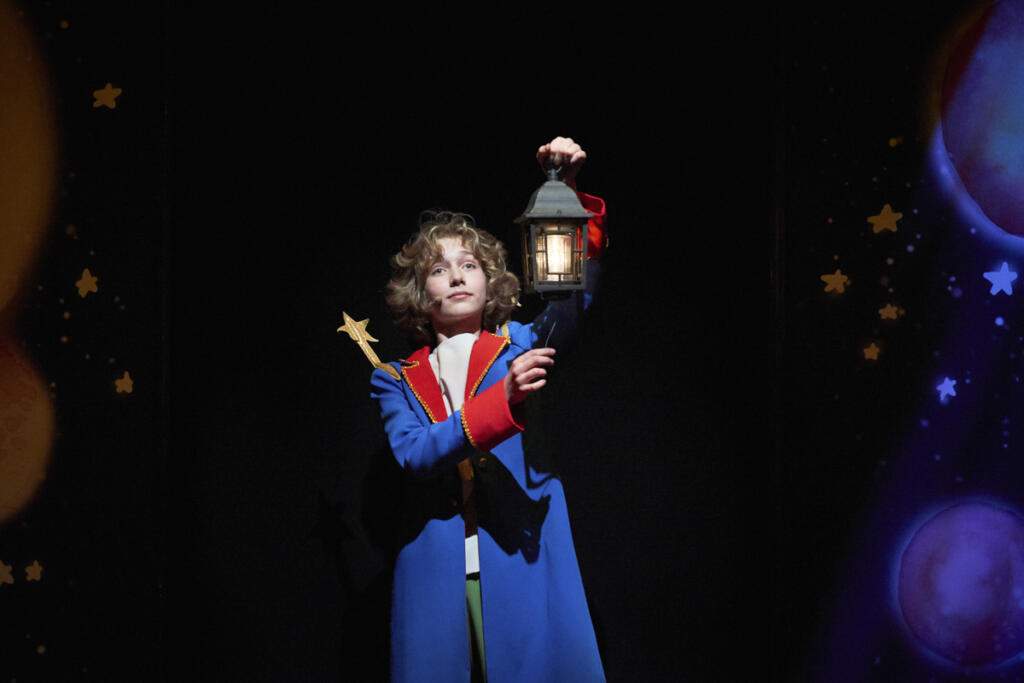
The Little Prince musical play by the Stas Namin Theatre of Music and Drama, 2012. The Little Prince – Stepan Yemelyanov, Photo Credit: www.stasnamintheatre.ru
The movie-musical The Little Prince directed by Stanley Donen (Paramount Pictures), with the screenplay by Alan Jay Lerner, premiered in 1974. The music and lyrics were created by the duo of geniuses – Frederick Loewe and Alan Jay Lerner. The role of the Little Prince was performed by Steven Warner, opposite such legends as Gene Wilder and Bob Fosse. However, the movie, as well as the songs from it, did not become popular, even though Loewe and Lerner won the Golden Globe Award in the Best Movie Score nomination in 1975.
In 1981 premiered the musical The Little Prince and the Aviator, written by John Barry and directed by Jerry Adler. Anthony Rapp played the Little Prince in previews, but the show never opened.
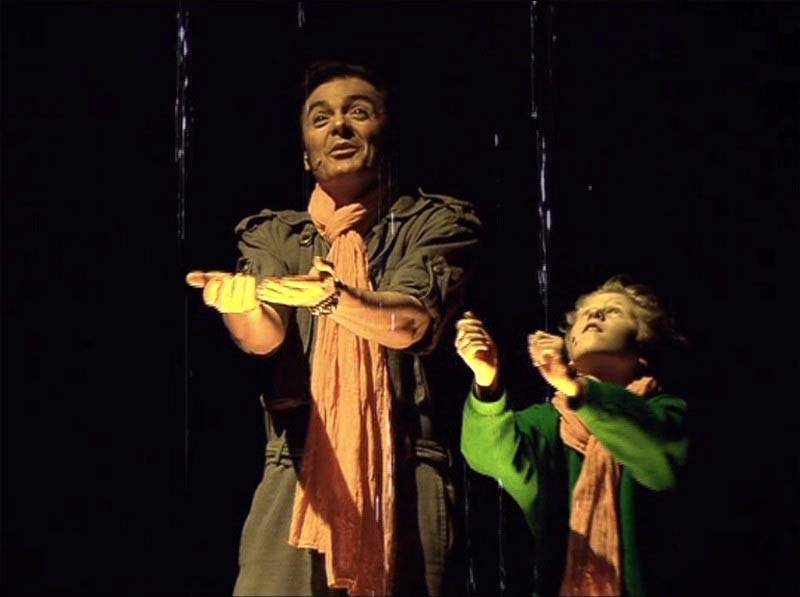
Le Petit Prince the musical, Aviator – Daniel Lavoie (L) and The Little Prince – Jeff (R), Photo Credit www.lavoiedelanature.net
In 2002, in Casino de Paris, the premiere of the low-budget musical by Richard Cocciante Le Petit Prince, based on the work of Antoine de Saint-Exupéry, took place. The main plot of this production is the story of a certain character, called Saint-Ex, a pilot, who, after having crashed during a flight over the desert, meets the Little Prince and during the whole of the musical writes in his diary what happens to him. Throughout one year, the show was reworked and re-edited, and as a result, the rich scenery appeared, as well as some colorful costumes and video installations. The main role was played by Daniel Lavoie, a favorite of the French public, the original performer of the role of Frollo in the previous musical by Cocciante – Notre Dame de Paris. The role of the Little Prince went to the young actor Jeff Tetedoie, who created a wonderful and touching image and was awarded the highest praise. However, the weak direction and too long of a score which consisted mainly of ballads in the style of French chanson, without a single “catchy” aria, sentenced the project to a short life. Only in 2007, the musical was revived by the order of the Shanghai Cultural Center, and in 2008 it moved to the Cultural Center of Hong Kong. The musical stayed within the borders of the French-speaking countries and was never able to reach Broadway. Its 20th anniversary was celebrated in a very humble manner and there were only a couple of concerts that occurred.

The Little Prince on Broadway 2022. The Little Prince – Lionel Zalachas (R), The Narrator – Chris Mouron(L), Photo Credit by Joan Marcus
In 2022, Broadway welcomed the original Sydney production of The Little Prince which appeared to be a circus-aerial spectacle and reminded of a computer game. The show was choreographed by Anne Tournie, the libretto written by Chris Mouron, and the music written by Terry Truck. The role of the Little Prince was played by a dancer – Lionel Zalachas. The expectations of the spectators and the theatre critics were not justified, and the production ended its run three months earlier than expected.
One can read and re-read The Little Prince endlessly. Especially if one wants to comprehend the art of small steps, which would allow one to grow into a Human, who would understand everything without words, since “…Language is the source of misunderstandings.” And who would learn “… to create ties….” Just as the Fox instructed and the Little Prince repeated after him: “…ONE SEES CLEARLY only with the heart. Anything essential is invisible to the eye.”
This post was written by the author in their personal capacity.The opinions expressed in this article are the author’s own and do not reflect the view of The Theatre Times, their staff or collaborators.
This post was written by Lisa Monde.
The views expressed here belong to the author and do not necessarily reflect our views and opinions.

